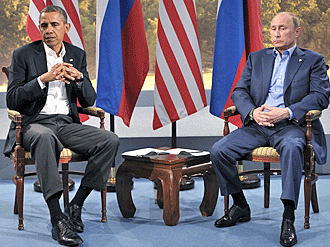Co-authored by William Witenberg a contemporary artist focused on abstract painting
Secretary of State John Kerry flew to Kiev to show solidarity with the new Ukrainian government. He delivered an economic package that included one billion dollars in loan guarantees and a promise to send in technical advisors to help Ukrainian government deal with its serious financial problems. Additionally, the Obama administration is seeking ways of making good on its threat of economic sanctions and political isolation, if Russia does not withdraw from Crimea. The one option not on the table is military.
While the military option is not on the table in reality implementation of meaningful economic sanctions are very limited. This is evidenced by Wednesday's announcement that the EU is lending the Ukraine $15 Billion on top of the United States $1 Billion. While these loans are crucial to prevent total economic collapse in the Ukraine, they are the reverse of sanctions on Russia. Ironically, any money that is lent or given to Ukraine will be used to pay for Russia gas and thus will end up back in the Russian economy.
Russia is not Iran. Sanctions that are being discussed by the Congress are non-binding and if implemented would force Russia, according to Russian Foreign Minister Sergei Lavrov to seize assets of Western companies and individuals. Hence, sanctions are stuck in the same stalemate that military options are. To compound the problem the European Union is not likely join in serious economic sanctions.
Germany stands to lose the most from economic sanctions on Russia. Germany is the European Union's biggest trading partner with Russia. It is reported that 35% of German oil and gas imports come from Russia. Many major German companies such as its largest generic drug maker receive significant revenue from Russia.
Without Germany on board economic sanctions will not have any teeth and them and it is unlikely Germany will hurt itself to make a point to Putin about his move into Crimea.
Despite Japan's condemning of the occupation by Russian of Crimea, it is not likely Japan will be supportive of economic sanctions against Russia. Japan, after the closing of its nuclear power plants due to the meltdown in one reactor, is dependent on importation of fossil fuel from Russia.
Without military options, with the ability of Russia to seize assets of Western Companies and individuals, without the possibility of European or Japanese support of meaningful sanctions America is left with very little that it can do economically to Russia. While it can donate or lend money to the Ukraine it does not punish Russia by helping Ukraine.
It is hard to imagine that the boycott of the G-8 scheduled in Russia had much impact on Putin. John Kerry's suggestion that American businesses may want to "start thinking twice about whether they want to do business with a country that behaves like this." Rings hollow in light of the fact that America companies already have joint ventures with Russian companies that have not been affected.
At the moment it appears that whether unlawful or not the occupation of Crimea will not end because of military or economic sanctions by the EU and the United States. Loans will prevent the collapse of Ukraine. But will ironically in effect be giving money to pay for Russia gas which the Ukraine will be obligated to pay back.
